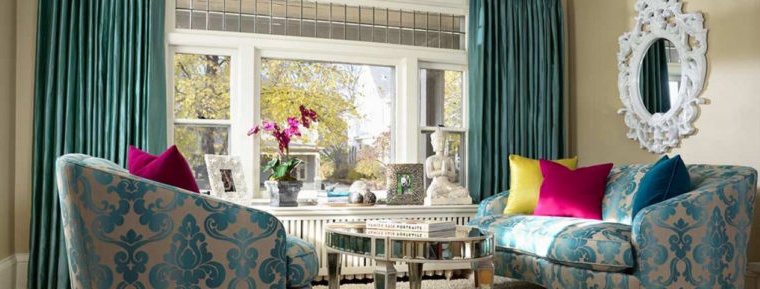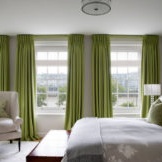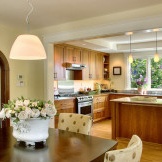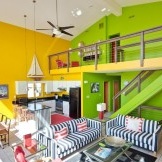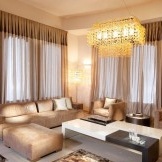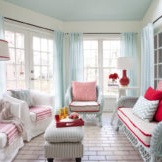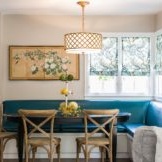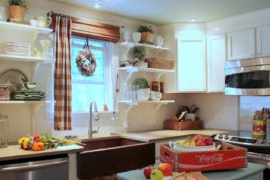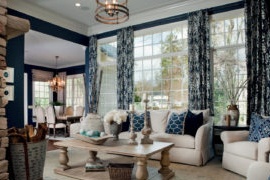Curtains for the living room - current ideas 2018
Living room - the main presentation room of any home. This room is always in sight and its design must be approached with special care. If we talk about the choice of curtains for the living room, then this is one of the most pleasant finishing touches in the process of forming the interior of this multifunctional room for relaxing all households and hosting guests. In addition, it is with the help of new textile for windows that you can change the image of the entire room quite quickly and at the lowest cost. We suggest you familiarize yourself with interesting solutions for drapery windows in living rooms of various sizes and stylistic directions with the help of our large-scale selection of modern design projects.
A variety of models for a modern living room
Many designers when creating modern living room decoration projects recommend completely abandoning the use of textiles for window decoration. Explaining their actions by the fact that without any obstacles, sunlight will better spread throughout the room, and the image of the room will correspond to the concept of minimalism. But is it so comfortable to rest and relax after a hard day in a room without curtains? And what about those who live on the ground floor, those whose room faces the south side of the building and is literally flooded with sunlight for most of the day? For most of our compatriots, comfort in the home is not possible without textile decoration of the premises. And the living room, as the main common room of an apartment or a private house, simply must be convenient, comfortable, beautiful, cozy and stylish.
Traditional model
Classics never go out of style. That is why traditional curtains, which are long, straight canvases of fabric, are relevant at all times. New types of fabrics appear, original colors and prints, ways of attaching curtains to curtain rods, but the classical model itself remains at the peak of popularity. In our country, the traditional tandem of dense curtains and thin, translucent tulle is the most popular option for designing window openings in the living room. Transparent curtains are sewn from a thin air veil, which soften sunlight, make it more comfortable for the eyes and create a pleasant atmosphere in the room. In turn, the curtains are designed to completely darken the living room if necessary. In total, the entire ensemble creates not only functional, but also a beautiful drapery of windows in one of the most important rooms of any home.
Traditional curtains can be attached to the cornice in various ways:
- clamps;
- rings
- loops;
- ties;
- eyelets.
In modern design projects of living rooms, traditional curtains are often equipped with canvases of other models - Roman, rolled, with blinds. The use of bamboo roller blinds along with classic straight canvases became popular. And the matter is not only in the mainstream for everything natural, natural, but in the laconicism and practicality of such a decision. Bamboo curtains reliably protect the room from sunlight, bringing notes of natural warmth to the interior. And traditional curtains act as a decorative element most of the time and create complete blackout in the living room, if necessary.
Curtains with eyelets
When creating a living room design in a modern style, I use curtains on grommets very often. Eyelets - plastic or metal rings that are attached to round holes made in fabric for threading onto a cornice in the form of a hollow tube. As a result, uniform flowing folds are formed in the curtains, which, with their rigor and geometricity, can decorate any window.In addition, long vertical folds are able to visually increase the height of the room if the cornice is placed under the ceiling and the fabric is hemmed to the floor.
Curtains with eyelets can be attached to the cornice in two ways:
- directly string the canvases on the ledge through the eyelets;
- use rings or ties as intermediaries between curtains and curtain rods.
The size of the eyelets themselves can be different and depends on the diameter of the cornice. The fittings can be barely noticeable, carry an exclusively functional load. And grommets can stand out against the background of plain canvases with a golden or silver sheen, and a contrasting color of plastic.
Curtains with pelmet
In addition to its basic functions, tulle and drapes often serve as a color or textured “bundle” of some interior elements. To make the transition in colors more harmonious, you can use both simple window drapery solutions and ensembles supplemented with curtain accessories - pick-ups and brushes, lambrequins and other types of decorative elements.
Lambrequin is a horizontal decorative canvas, which is located in the upper part of the window drapery, usually occupying the entire width of the cornice. Most often, the ensemble of curtains and drapes complement the lambrequin, but the modern style does not put any restrictions on the use of this decorative element with other variations of curtain models.
Lambrequins not only help to effectively complete the curtain composition, to give the drapery of the window a festive and even solemn appearance, but they are also able to hide the flaws in the decoration or installation of the window unit.
A lush classic pelmet will give a festive look even to the most ordinary canvases. The status of a living room instantly increases if, in addition to traditional curtains, such a decorative element as a lambrequin is used to decorate window openings.
Lambrequin “bando” is used very often, it is an even, straight piece of fabric, fixed on a solid base (most often non-woven). This lower edge can be straight (in this case, the lambrequin looks like a regular fabric rectangle) or it can be cut in any shape.
Roman curtains
Roman curtains due to its versatility, laconic design and incredible practicality are actively used in the design of modern homes. Living rooms are no exception. With only one amendment - Roman curtains rarely become the only element of the decor of window openings, speaking in the company with traditional paintings. Moreover, most often different models of curtains are made of different materials - some are supplied with a pattern, others - appear in a single-color version.
Roman curtains are vertical canvases with a window width that are assembled by uniform horizontal folds manually or using an electric drive. Laconicism and simplicity of execution, economical consumption of material and many options for execution (in color, pattern and texture), helped Roman models become incredibly popular.
Japanese fabric panels
Japanese curtains are sliding fabric cloths, rigidly stretched into a rectangular shape. This model of window drapery is also called a fabric screen. For the minimalist moods of modern style, such a laconic version of the design of window openings or as a zoning element fits perfectly. Japanese curtains can be performed in a monophonic variation or represent canvases with a dull pattern (most often floral or abstract).
Color solutions for a harmonious interior
Before you watch endless color layouts on the Internet or go in search of the right fabric in stores, you need to decide whether your curtains should become an accent element of the living room, stand out against the general background, attract all the attention or stay in harmony with the chosen color scheme and leave the opportunity to be at the center of all glances to other home decoration.Not only the color choice for the execution of the curtains will depend on this, but also the selection of the appropriate accessories - cornice, pickups, fastener parts.
Neutral colors - an ideal window decoration with textiles in case:
- You are not confident in your ability to combine colors;
- your living room has a modest area;
- the living room windows face the north side or sunlight covers the branches of trees, buildings and structures;
- you want to create a light, airy image of the room without dark, contrasting spots.
All shades of white, from boiling snow-white to milky, light beige tones, the color of dusty roses and “coffee with milk” - all these colors can organically fit into almost any interior. Any color scheme and stylistic direction in the design of the living room can without loss in harmony and balance transfer the integration of such drapery for windows.
Almost all shades of gray are considered neutral and organically fit into any interior design. You can safely use the gray color as a solution for drapery windows in the living room, even if you intend to change the atmosphere of the room soon - replace upholstery of upholstered furniture or carpet, even wall decoration. Due to its versatility, gray color has not gone out of fashion for several seasons in a row.
Not only natural fabrics are in fashion, but also shades that can easily be found in nature:
- sand;
- mustard;
- olive;
- pistachio;
- aquamarine;
- a shade of foggy sky;
- tone of overripe plum;
- milk chocolate.
Dense dark curtains are not only a reliable protection of the room from sunlight and prying eyes, but also a contrasting accent in the interior. In particular, if this dark spot will be the only one in the design of the living room. Dark blue color, shade of gray, which is commonly called “wet asphalt”, deep plum tone, dark chocolate color and even black - all these options will organically look in a modern living room of medium and large sizes, giving the room mystery and some drama.
Original look curtains made in the style of "colorblock". They combine the fabric of two or three colors, sewn horizontally. An unusual design technique allows even the simplest fabric to make an original drapery for windows. Depending on the color scheme of the room, you can use contrasting or close to each other in color spectrum shades.
Another way to combine fabrics when sewing curtains is to connect two or more types of material vertically. Most often, bright or printed material acts as a fringing, framing a narrow strip of neutral color with a canvas of classic curtains. This method of color highlighting the canvas allows you to not only emphasize the drapery of the windows, but also visually "stretch" the room in height.
If the curtains are assigned the role of an accent element, then you can choose a really bright, colorful fabric color. But in this case, a prerequisite is necessary - there should be one such bright elements in the interior design. Otherwise, there may be a color imbalance in the image of the room, which will not only confuse the perception of the interior picture, but also destroy the atmosphere of coziness and psychological comfort.
If we talk about a print for curtains, then a large drawing is in fashion. This can be a geometric, floral or abstract print using similar shades of color. But it is important to remember that curtains with large ornaments will be appropriate only in rooms of medium and large sizes. For small living rooms, a colorful print of fabric on the windows can create a negative effect. In any case, with an abundance of bright fabrics, it is better not to overdo it.
And finally
Some tips for choosing drapery for living room windows:
- nobody canceled the “golden rule” of choosing curtains depending on the color - if the wall decoration in the living room is plain, then the fabric for window drapery can be printed and vice versa - if the wallpaper is in the room with a pattern, then the curtain material should be plain;
- fabrics on store shelves and windows look different. Before purchasing material - be sure to inspect it in the light;
- Going to the store, take with you a piece of wallpaper that pastes the walls in the living room. If the walls are painted, then photograph the color of the finish. This will help you on the spot to determine the shade of the fabric.
By experimenting with the choice of material, method of execution, drapery and curtain accessories, you can always create a completely unique ensemble for decorating windows in the living room, bringing not only originality to the created interior, but also your own vision of style, beauty and aesthetics. You can find a way to transform the already created room design for any stylistic design of a common room for the whole family - the living room.

